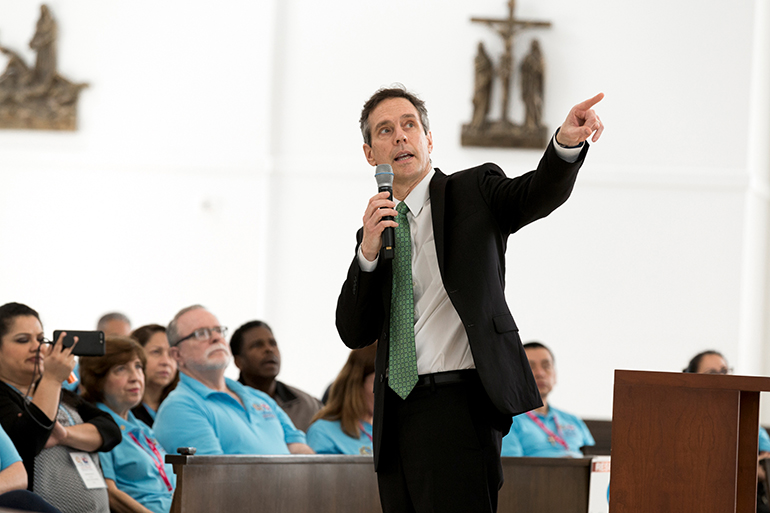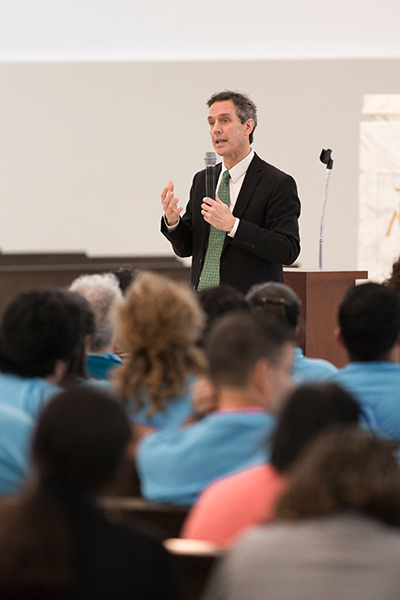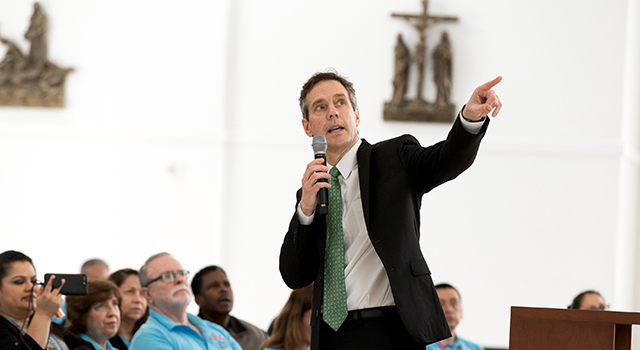By Tom Tracy - Florida Catholic

Photographer: TOM TRACY | FC
Sean Callahan, president and CEO of Catholic Relief Services, the official international humanitarian agency of the U.S. bishops, speaks Feb. 23 to 300 mostly Hispanic leaders from 30 dioceses in the southeastern U.S., who were gathered at Our Lady of Guadalupe Church in Doral for the Southeast Regional Encuentro, Feb. 22-24.
DORAL | The head of Catholic Relief Services told several hundred Hispanic leaders from the U.S. southeast recently that they are a vital part of the Church’s future “global voice” and missionary discipleship.
“The statement you see on signs all the time now is ‘when you see something, say something,’ and to be a missionary disciple it is ‘when you see something, do something,’” said Sean Callahan, president and CEO of CRS, the official international humanitarian agency of the Catholic community in the United States.
“We need to be seen as the doers, and there is a great opportunity right now for the Catholic Church to come together and be more of a force for right and for justice in a country of people who want justice,” he said.
Callahan, a 28-year veteran of CRS in his second year as leader at the Baltimore-based agency, spoke Feb. 23 to about 300 mostly Hispanic leaders from among 30 dioceses taking part in the Southeast Regional Encuentro. The group met Feb. 22-24 at sprawling Our Lady of Guadalupe Parish in Doral, just west of Miami International Airport.
Since 2015, CRS has been one of four major sponsors of the Encuentro, which is described as the U.S. Church’s most important and comprehensive initiative in Hispanic ministry. The Encuentro involves an estimated one million pastoral leaders, 175 dioceses and numerous Church organizations, parishes and lay ecclesial movements.
Callahan told the Florida Catholic that the Miami gathering represented a significant moment of encounter for CRS and U.S. Hispanic Catholic leadership, and that CRS is interested in listening as the Encuentro participants discuss and define their future role as Hispanic Catholics in America.
“This is the first Encuentro we have been so involved with this intimately,” he said.
“One of the strengths (of this partnership) is bringing the voice of the American people overseas,” to let them know “that people here care about them,” Callahan added. “We want to see where that part of the Church comes out in this Encuentro process.”

Photographer: TOM TRACY | FC
Sean Callahan, president and CEO of Catholic Relief Services, the official international humanitarian agency of the U.S. bishops, speaks Feb. 23 to 300 mostly Hispanic leaders from 30 dioceses in the southeastern U.S., who were gathered at Our Lady of Guadalupe Church in Doral for the Southeast Regional Encuentro, Feb. 22-24.
Asked about President Donald Trump’s March 5 expiration date for the Deferred Action for Childhood Arrivals Program (DACA), which offers protections for young immigrants who came to the country illegally as children, Callahan said that CRS has been following the lead of the U.S. bishops in urging a political solution sooner rather than later.
“We are supporting the initiative promoted by the bishops of having everyone reach out to their senators and congressman to make sure action is taken on DACA” sooner rather than later, Callahan said.
If Congress does kick the ball down the road, “then the question is: Does the United States government start to deport people who have been in the U.S. for most of their lives, and do we start breaking apart families, livelihoods, businesses, friends, communities?” Callahan said. “It is incredibly disruptive to have over 700,000 under the threat of being deported at any time.”
Likewise, CRS is publicly urging that the U.S. not drastically reduce spending on foreign humanitarian assistance and food aid. A cut of some $2.5 billion was reportedly proposed in the administration’s Fiscal Year 2019 budget request.
“The proposals are anathema to the American spirit and who we are in reaching out to people, and frankly being a leader in the world doesn’t mean you have more money, being a leader in the world is showing you care for people,” Callahan said.
“The Catholic Church’s activities in the U.S. and overseas are very value-based, and though we have seen the threat of cuts there has been an outpouring of people who say this is who we are and we need to continue it, and there are people in Congress who say, ‘we agree.’”
Callahan, who worked in Central and Latin America during his career at CRS, touched on several other timely regional concerns, including the gang and drug-trafficking related humanitarian crisis in several Central America nations as well as the ongoing political and economic hardships in Venezuela.
Callahan underscored the impact that CRS and the Church are having with at-risk youths in places like Guatemala, for example, by helping young adults train for employment and stay in the country rather than become economic refugees.
“In many cases people are being forced out from where they are, and our job is to allow people to stay where they want to stay, with safety and security for their family, with the right to employment,” he said, citing specifically “the northern triangle” of El Salvador, Guatemala and Honduras as “one area that we really want to intervene and reduce violence.”
Venezuela, he added, is a key country in a lot of turmoil, where inflation has spiraled out of control. CRS assists there by working with Caritas International and Caritas Venezuela. “The people are suffering and it is time for us to express our solidarity,” he said.
Callahan also talked about inspirational encounters he had with Mother Teresa and the Missionaries of Charities during the time he lived in India.
Callahan began his career with CRS 28 years ago and has served as director of Human Resources, regional director for South Asia, head of its Nicaragua program, executive vice president for overseas operations and chief operating officer.
He currently also serves as president of Caritas North America and is on the board of trustees for Catholic Charities USA. He has served on the Executive Committee and Representative Council of Caritas Internationalis, a Vatican-based confederation of 165 Catholic relief, development and social service organizations.
CRS now works in 110 countries and assists 137 million people annually, he noted, adding that large scale migration from Africa into Europe will continue to pose a humanitarian challenge in the coming decades.

